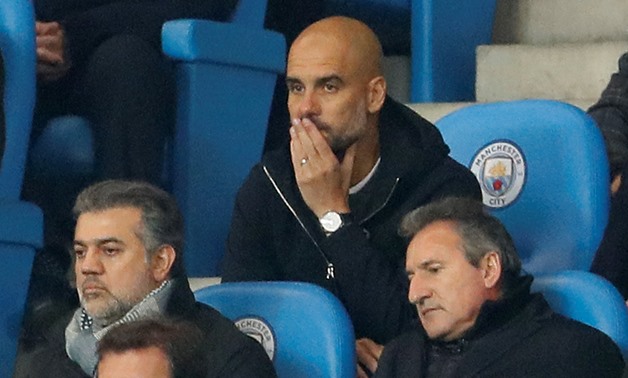
Soccer Football - Champions League Quarter Final Second Leg - Manchester City vs Liverpool - Etihad Stadium, Manchester, Britain - April 10, 2018 Manchester City manager Pep Guardiola sat in the stands Action Images via Reuters/Jason Cairnduff
MANCHESTER - 11 April 2018: Even before Tuesday's Champions League exit at the hands of Liverpool, Manchester City manager Pep Guardiola acknowledged his team were not ready to win Europe's elite club trophy.
Now the Spaniard's task, once the Premier League title is formally secured, will be to identify exactly what he needs to add to his team to progress further in Europe after their 5-1 aggregate quarter-final defeat to Juergen Klopp's side.
"Last season we were not able to get the feeling that we were ready to compete in Europe," Guardiola said before Saturday's Premier League derby loss to Manchester United and after Wednesday's 3-0 first-leg defeat at Liverpool.
"Right now, I think we are still not ready to win the Champions League but we made a step forward in that competition. There’s something special in terms of the quality of opponent and anything can happen".
The former Barcelona and Bayern Munich manager, who won the Champions League with the Spanish club in 2009 and 2011, has often framed the issue of City's challenge to improve in the Champions League purely in terms of experience.
"This team is ready to fight with all the teams but the other teams are so good, it is difficult – a mountain – but we can compete, especially at home. For the next step maybe we need more time. Next season we will be better," he said.
“Last season it was the round of 16, this season it’s the quarter finals, hopefully next season we can go to the semi-finals," he added after Tuesday's defeat.
But Guardiola surely knows the exit to Monaco last season on away goals, after a 6-6 aggregate score, and defeat by Liverpool were not just about lack of experience in the competition.
The need for tighter defending to accompany the thrilling attacking football his teams are known for is an old issue that has re-appeared this week, with the three second half goals conceded in their 3-2 loss to United emphasising the point.
The addition of Kyle Walker and Aymeric Laporte have added quality to the defence and Benjamin Mendy made a promising start to the season at left back until injury halted his campaign.
But with Vincent Kompany now 32 and having had another injury-interrupted season, Guardiola may well look for a central defender as an alternative to Nicolas Otamendi and John Stones.
PHYSICAL PRESENCE
At the other end, scoring has not been a problem for City, who have 90 goals from 32 Premier League games so far, but it is odd that such an expensively assembled squad only includes two out-and-out central strikers in Gabriel Jesus and Sergio Aguero.
Raheem Sterling, Leroy Sane and David Silva are all capable of contributing goals but as City struggled to break down Liverpool on Tuesday despite their waves of attack, the absence of a physical presence in attack was noticeable.
Guardiola's game doesn't involve many long balls or crosses from deep but there are times when someone with a different skill set, coming off the bench, could surely help.
Former City striker Edin Dzeko's performance for Roma in their win against Barcelona on Tuesday was a reminder that 'number nines' are still useful in the modern game.
With all their resources, City could surely make use of a different kind of forward to supplement their current duo.
There is also something more intangible lacking from City at crucial moments - especially in those 'mad minutes' where they have let in multiple goals in a short space of time, such as at Anfield in the first leg and in Saturday's Manchester derby.
They have looked shell-shocked during those spells, perhaps because adversity is so rare but maybe also because they lack a calming, organising influence on the field, a commanding figure who can ensure they regroup and break the opposition's momentum.
As for tactics, Guardiola's conviction that attack is the best form of defence is unlikely to change, although he may ponder whether, in two-legged games in the Champions League, a little more pragmatism might not go a long way.


Comments
Leave a Comment